Let me guess:
You have 1-3 years’ experience and you’re wondering whether an MBA would fast-track your career.
While you consider MBA programs from various business schools, you find all the good ones asking for a GMAT score.
You probably guessed GMAT is some sort of entrance exam.
And like for any other exam, the first question that pops into your mind is: “Is the GMAT hard?”
In this article, I’ll answer that question… as well as other related questions.
Is the GMAT Hard?
In general, GMAT gets harder as you answer more questions correctly because GMAT is adaptive. GMAT’s adaptive algorithm changes the difficulty of the next question based on previous responses. So, to get a high score, you should maintain an accuracy of 60-70% even as the questions get tougher.
Here’s a simplified model describing how GMAT’s algorithm works:
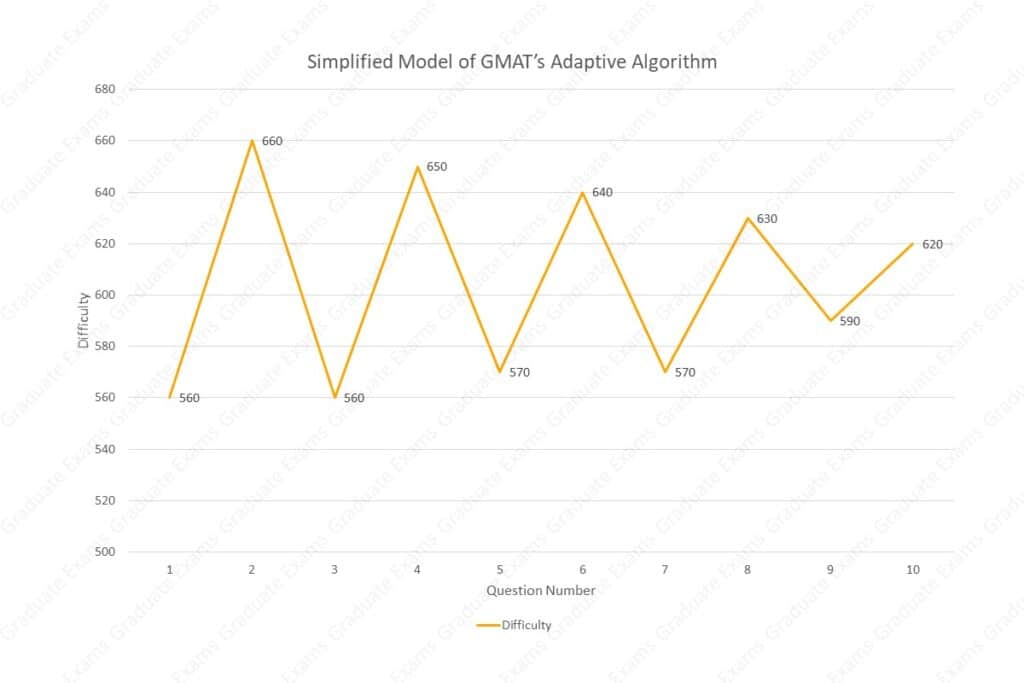
When the test starts, the algorithm does not know anything about your ability. So, it starts with a medium level question. The median score on GMAT is 560.
If you answer the question correctly, the next question the algorithm serves will be of a higher difficulty.
In the early stages of the test, the algorithm makes big changes in the difficulty.
For instance, if you answer the first question correctly, which is a level-560 question, the second question might be a level-660 question.
If you answer the level-660 question incorrectly, the next question might be another level-560 question.
As you can see from the graph, the swings become smaller as you answer more questions.
At a point in the middle of the section, the algorithm detects a narrow range where your performance stabilized. The range where your answering pattern becomes predictable is the range in which your final score lies.
Therefore, to get a high score, your performance must become stable in the 660-710 range for the quantitative reasoning section, and in the 560-710 range for the verbal reasoning section.
But to reach that stage, you should show the algorithm that you can answer easy and medium questions without any difficulty.
Save this image for future reference.
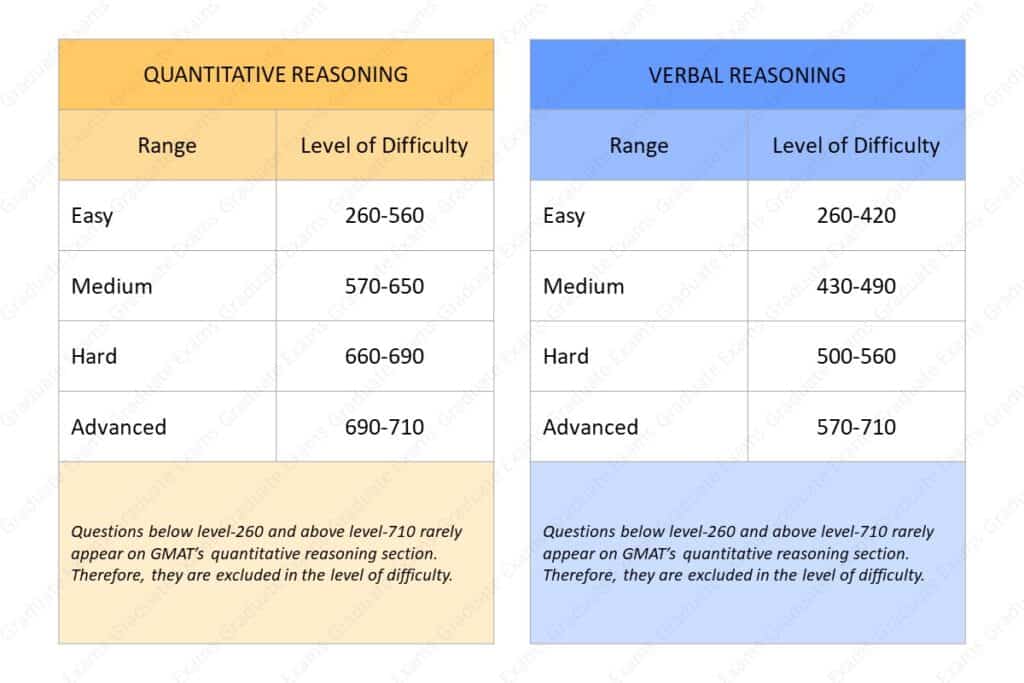
Now that you know how GMAT’s adaptive algorithm affects how difficult the exam is, let’s look at what is tested on GMAT in each section.
However, you may also have some specific questions about getting a 700+ score on GMAT. So, I wrote an article explaining how hard is it to get 700 on GMAT. I recommend you read the article for a clear explanation on what it takes to get 700 on GMAT.
What is tested on the GMAT?
GMAT tests your ability to analyze quantitative data to draw conclusions, comprehend dense text to evaluate logical arguments, and correct language to conform to business standards. While most of the concepts tested are at the high-school level, their application requires higher-order thinking.
GMAT is a 3.5-hour long exam with four sections. The sections, question formats, number of questions, and time limit are as follows:
Save this image for future reference.
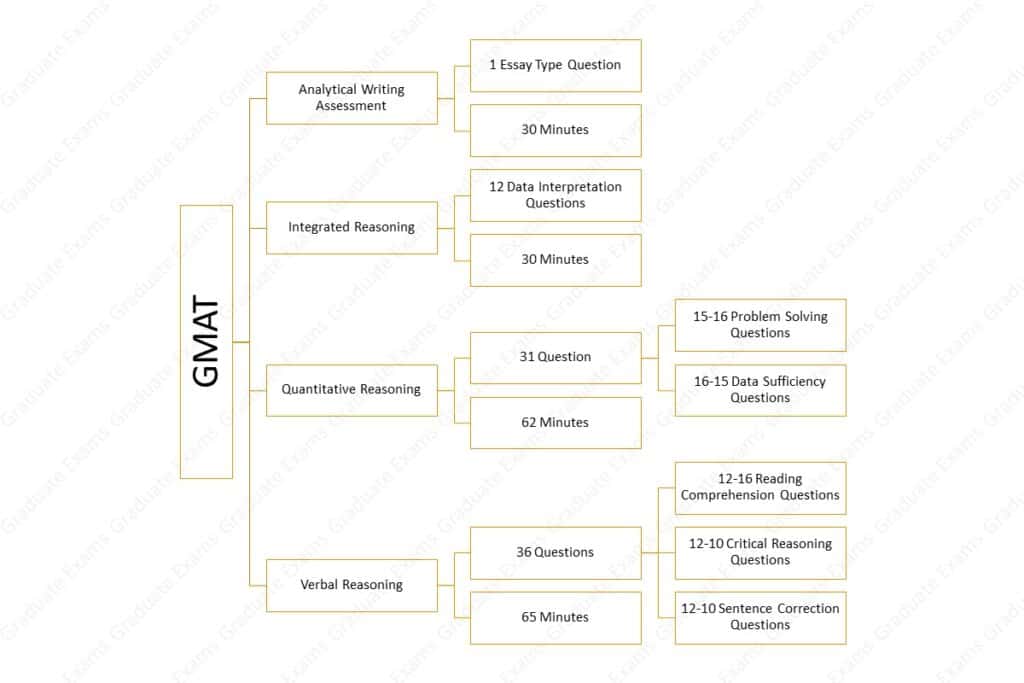
Next, we’ll discuss the topics and subtopics tested from each section. Let’s begin with the quantitative reasoning section.
Save this image for future reference.
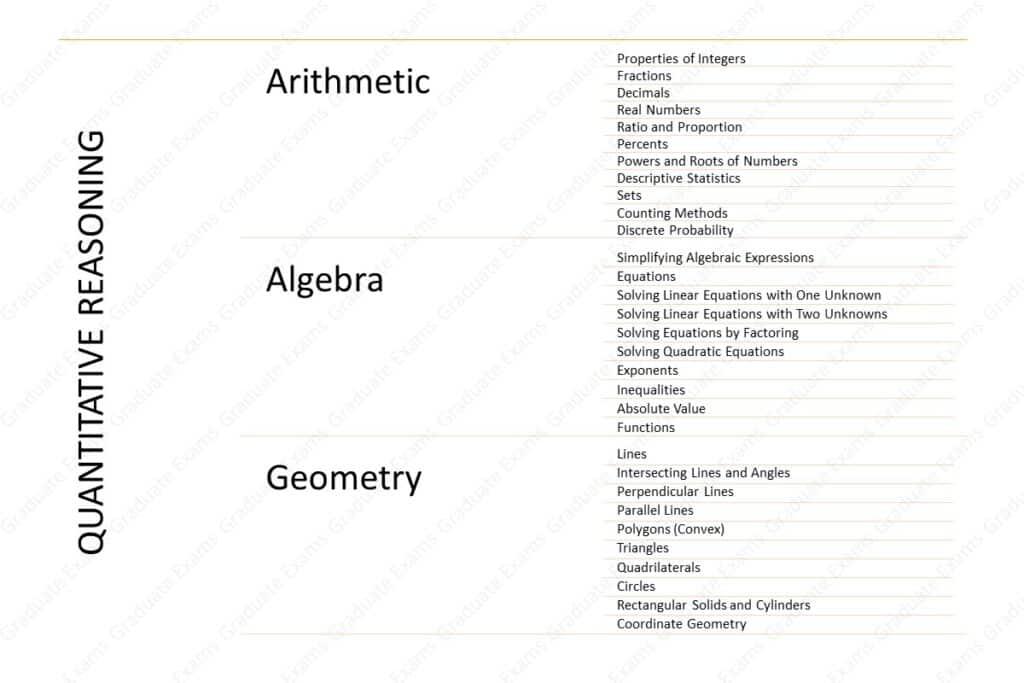
If you want to know more about the quantitative reasoning section, I recommend reading the following articles:
- Is GMAT Quant Difficult? (Expert Answer with Proof)
- How to Score 51 in GMAT Quant (21 Field-Tested Tips)
- GMAT Verbal or Quant More Important – Quant vs Verbal
- How to Improve GMAT Quant Score (21 Proven Tips)
Here are the topics for the verbal reasoning section:
Save this image for future reference.
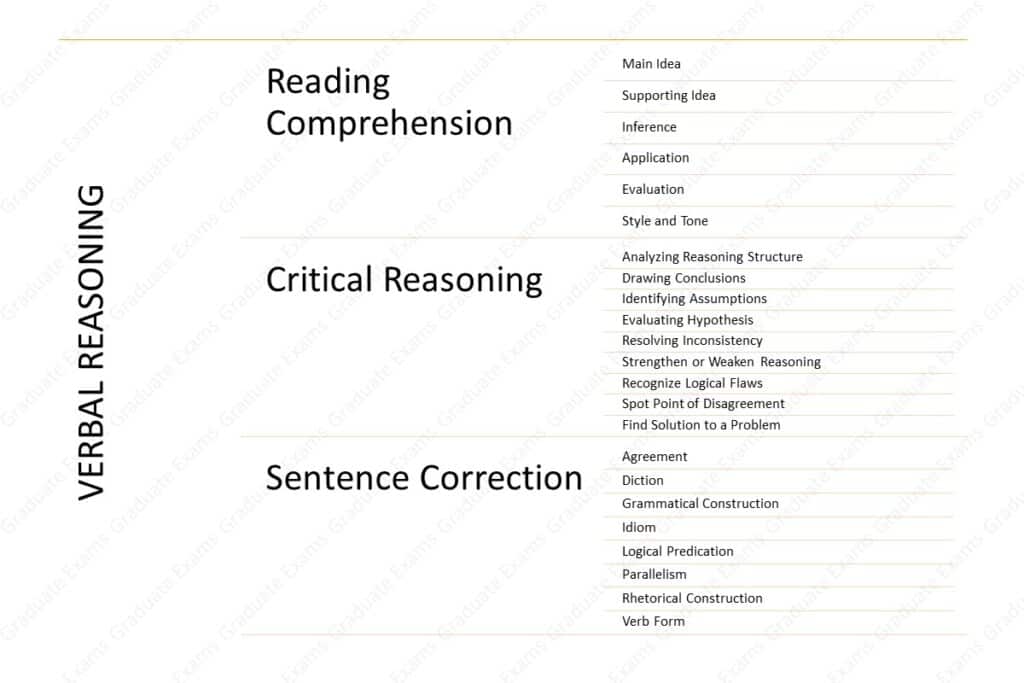
Here are some articles on the verbal reasoning section that will help you with your preparation:
Your scores in the analytical writing assessment section and the integrated reasoning section do not contribute to your total GMAT score. These two sections are also not adaptive. Therefore, for this article, we’ll skip these two sections.
Source: How is the GMAT Exam Scored
Is it hard to get 600 on GMAT?
Typically, getting 600 on GMAT is not hard. For this score 40-60 hours of preparation is sufficient. Also, 54% of the people who take the GMAT score less than 600. Given how common the score is, and the amount of preparation required, getting GMAT 600 on GMAT is easy.
Here are the recommended quant-verbal splits for getting a GMAT 600 score:
Save this image for future reference.
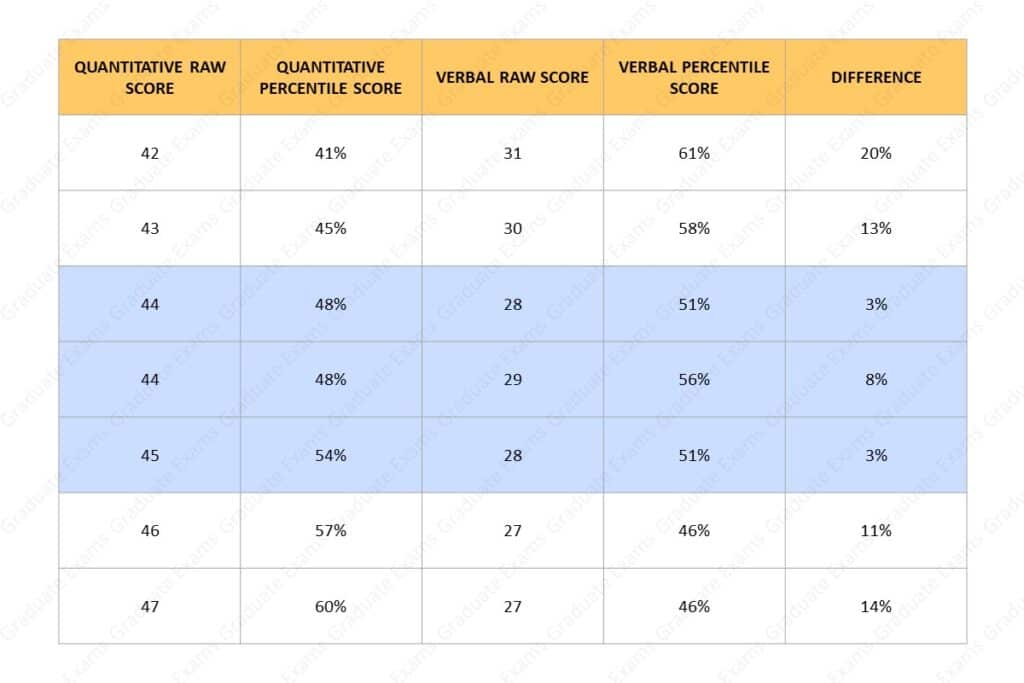
The table in the picture does not cover all the possibilities. But it does contain all possibilities where the difference between the percentile score in the quantitative reasoning section and the verbal reasoning section is less than 20 percentile points.
Business schools prefer applicants with a balanced quantitative reasoning and verbal reasoning ability. Therefore, scores where the difference is more than 20 percentile points can hurt your chances.
The quant-verbal splits highlighted in blue are the ideal splits because the splits limit the difference to 10 percentile points.
As you can see, for these ideal splits, you need to score only 48-54 percentile for the quantitative reasoning section and 51-56 percentile in the verbal reasoning section.
So, if you’re able to solve all the easy and medium questions in the GMAT Official Guide, you’ll be able to hit these targets.
Here are some useful articles about the best GMAT resources and preparation strategy:
- Best GMAT Resources (Top 10 Recommendations)
- Is GMAT Official Guide Enough? (+Resource Guide by Score)
- GMAT Preparation Where to Start (10 Awesome Tips)
- How to Start GMAT Preparation from Scratch (Ultimate Guide 2021)
- GMAT Preparation Time for Beginners (2021)
How hard is it to get 650 on GMAT?
Getting 650 on GMAT is not easy. 73% of test takers score less than 650. Hitting the score requires 60-90 hours of preparation spread across 1-2 months. Also, scoring 650 on GMAT requires thorough knowledge of easy and medium concepts and a working knowledge of hard concepts.
To get a 650 on GMAT, here are the recommended quant-verbal splits:
Save this image for future reference.

From the table, you can see that for getting a GMAT 650 score, you must score within the following ranges:
- Quantitative Reasoning: 60-67 percentile
- Verbal Reasoning: 61-68 percentile
You can easily reach these scores by solving all the easy and medium problems in the GMAT Official Guide and taking full-length practice tests.
How hard is it to get a 700 on the GMAT?
Scoring 700 on GMAT is hard because of the rarity of the score, difficulty of questions, and amount of preparation. 88% of test takers score less than 700. Scoring 700 requires 90-120 hours of preparation because you must be thorough with not only easy and medium concepts but also hard concepts.
Let’s look at the recommended quant-verbal splits for getting a 700 on the GMAT:
Save this image for future reference.
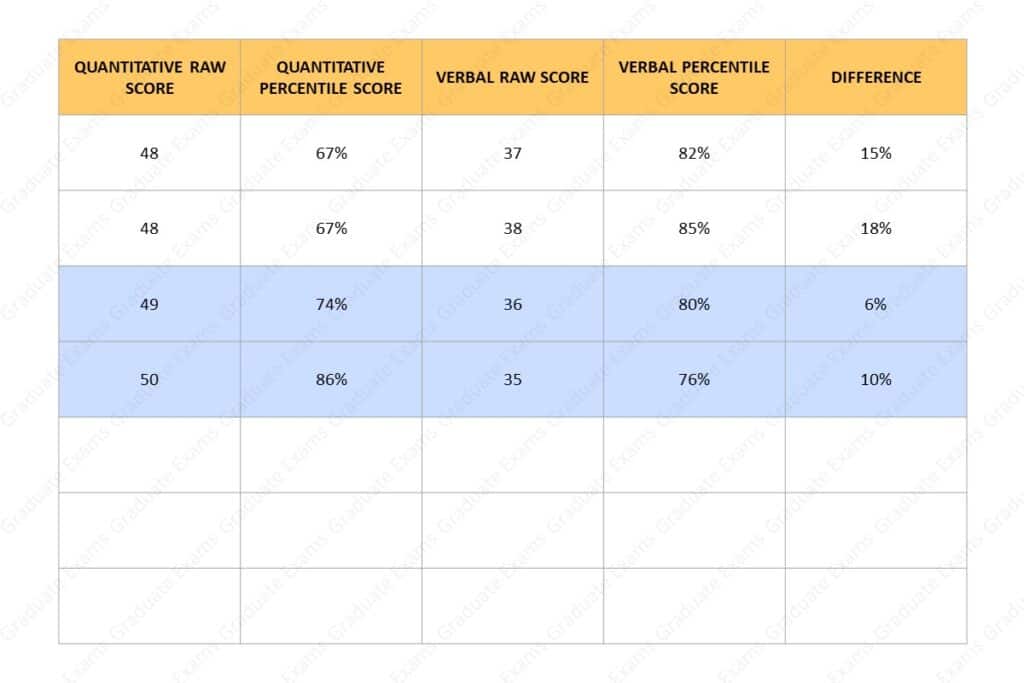
You can score 700 on GMAT in more than 20 different ways. Among these, only four of them reduce the disparity between the quantitative reasoning score and the verbal reasoning score to less than 20 percentile points.
Among these four possibilities, the ones highlighted in blue are the ones I recommend.
In these cases, you need one of the scores to be in the 70s and the other in the 80s. Achieving this split requires 90-150 hours of preparation and mastery over test taking strategy.
Here are some article specifically written to score 700 or more on GMAT:
- Is GMAT 700 a Good Score? (GMAT 750 Scorer Answers)
- How to Score a 700 on the GMAT (21 Awesome Tips)
- How Long to Study for GMAT 700
- GMAT Preparation Self Study Techniques for a 700+ Score
- How to Use GMAT Official Guide to Get 700 on GMAT
How hard is it to get a 730 on GMAT?
As a rule, scoring 730 on GMAT is difficult. Only 4% of test takers score 730 or more. Achieving this score requires 120-150 hours of intense preparation to build proficiency in consistently answering high-difficulty questions quickly and with high accuracy.
730 is an elite-level score on GMAT. In top business schools such as Harvard, Stanford, and Kellogg, the average GMAT score is 730. However, in colleges that are in the top 30-50 ranks, a GMAT 730 score can get you an admit with a scholarship.
So, let’s look at the quant-verbal split for scoring 730 on GMAT.
Save this image for future reference.
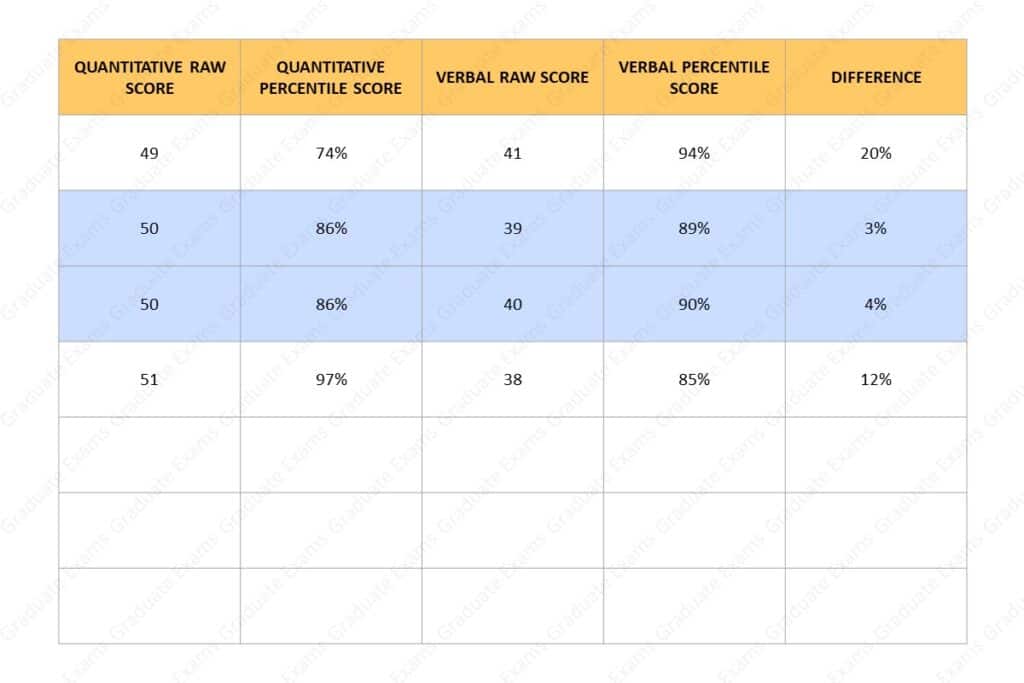
From the splits, you can see that to score GMAT 730, you need to score in the high 80s or the low 90s for both the sections. Achieving these scores is not possible unless you take many sectional tests and full-length tests and analyze your performance.
Analyzing your performance will reveal areas of improvement. And addressing those areas of improvement will help you hit that high percentile score. Without rigorous testing and analysis, a 730+ score on GMAT is extremely hard to get.
Here’s an in-depth article on analyzing your test performance. You’ll find it very helpful in finding areas of improvement.
GMAT vs GRE
GMAT and GRE are two of the most common graduate exams. While many business schools accept GRE score, 9 out of 10 admissions happen through the GMAT score.
But at the same time, the average GRE score in the top universities is less than the average GMAT score. Here’s a case study to illustrate that:
For Harvard Business School’s Class of 2022, the GMAT score profile is as follows:
- Median Verbal: 42
- Median Quantitative: 48
- Median Total: 730
Whereas the GRE score profile is as follows:
- Median Verbal: 163
- Median Quantitative: 163
Source:
Harvard Business School’s Class of 2022 Profile
For comparison, let’s convert the GRE scores to an equivalent GMAT score.
For a GRE Verbal Reasoning score of 163 and GRE Quantitative Reasoning score of 163, the predicted GMAT scores are as follows:
- GMAT Total Score: 690
- GMAT Verbal Score: 39
- GMAT Quantitative Score: 44
Comparing the converted GRE score with the GMAT score profile, we can conclude the following:
The median GRE scores when converted to a GMAT score, the converted score is lower than the actual GMAT score.
| GMAT vs GRE Comparison for HBS (Class of 2022) | Score | Percentile |
| GMAT Total Score | 730 | 96 |
| GRE Converted to GMAT Total Score | 690 | 85 |
| GMAT Quantitative Score | 48 | 67 |
| GRE Converted to GMAT Quantitative Score | 44 | 48 |
| GMAT Verbal Score | 42 | 96 |
| GRE Converted to GMAT Verbal Score | 39 | 89 |
Source:
GRE® General Test Interpretive Data
What Your GMAT Percentile Ranking Means
We made similar comparisons with other business schools accepting both GMAT and GRE scores and this is what we found:
| Business School | Average GMAT Score | Converted Average GRE Score | Source |
| Stanford Graduate School of Business | 733 | 710 | Class of 2022 |
| The Wharton School | 722 | 660 | Class of 2022 |
| MIT Sloan School of Management* | 720 | 670 | Class of 2022 |
| Kellogg School of Management | 727 | 690 | Class of 2022 |
| he University of Chicago Booth School of Business | 724 | 680 | Class of 2022 |
| Haas School of Business | 727 | 660 | Class of 2022 |
| Tuck School of Business | 720 | 640 | Class of 2022 |
| Yale School of Management** | 720 | 710 | Class of 2022 |
| Stephen M. Ross School of Business* | 710 | 640 | Class of 2022 |
| Darden School of Business | 703 | 630 | Class of 2022 |
*Average of Middle 80% Range
**Median
In all cases, the converted GRE score is less than the GMAT score. Therefore, getting an admit with a high GRE score is easier than getting an admit with a high GMAT score.
Next Steps
GET IN TOUCH
If you need my help with your GMAT preparation, you can get in touch with me via email. Here’s my email ID:
ask@graduateexams.com
I look forward to helping you on your journey for a GMAT 700+ score. All the best.
IMAGE CREDITS
Featured Image: Question vector created by freepik – www.freepik.com
